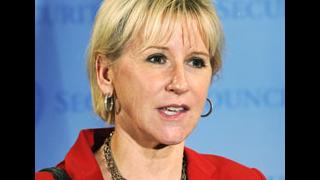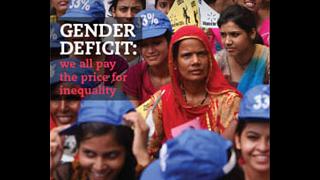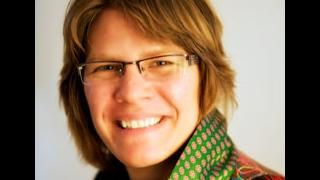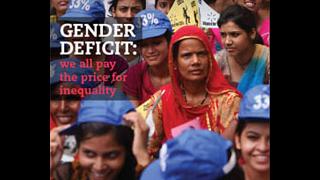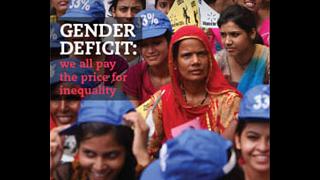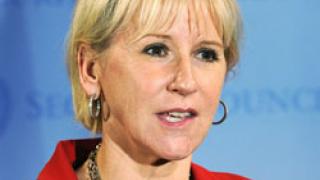
On the 100th anniversary of the first International Women's Day we have a lot to celebrate. Yet, despite the fact that we have made some progress towards equal opportunities, women and girls continue to be raped every day all over the world. The statistics are harrowing, particularly in countries such as the Democratic Republic of the Congo (DRC), where an estimated 40 rapes a day are perpetrated in some areas. But even one rape is one too many.
I am deeply committed to changing this situation. As UN Special Representative on Sexual Violence in Conflict, my first priority is to hold perpetrators to account, and to end impunity and amnesty for this type of crime. In the DRC, a safe life for Congolese women will require immediate, effective action as well as a continuous and stubborn fight against the impunity that has reigned for far too long. This entails a stronger focus on prevention, addressing serious shortcomings in the country's legal system, providing human rights training for soldiers integrated into the national army, and regulating the extraction of so-called conflict minerals - a responsibility shared by the DRC government and the international community. Such changes are possible.
The United States, for instance, has already taken action on regulating minerals from the DRC, such as gold, tin, tungsten and coltan, which help finance armed groups known to use sexual violence as a tactic of war. It is high time that the UK and the rest of the European Union followed suit. Urgent action is needed by all parties to ensure that a global regime for conflict minerals is established. As major donors to the DRC, the UK and the EU must also contribute to structural reform of the police, the military and the judicial system. Even small steps in this regard can make a big difference.
 In early January, 60 women were raped in Fizi in eastern DRC. Sadly, this is no longer news. The world is only too aware of what has been, and still is, happening in South Kivu, where sexual violence is systematic in nature. What is new - and positive - is that 11 suspected perpetrators from the Congolese national army were quickly apprehended and sentenced. This does not only illustrate that perpetrators stem from the national army as well as from armed groups; it also shows that our increased efforts in going after the criminals are yielding concrete results. By paying more attention to this type of offence, and by ensuring that offenders are held accountable, we are sending an important signal to all perpetrators: sexual violence is a crime that the international community takes extremely seriously. So, instead of being a cheap, silent and effective weapon, sexual violence becomes a liability - regardless of whether it has been ordered by troop commanders, officially sanctioned, condoned or not prevented.
In early January, 60 women were raped in Fizi in eastern DRC. Sadly, this is no longer news. The world is only too aware of what has been, and still is, happening in South Kivu, where sexual violence is systematic in nature. What is new - and positive - is that 11 suspected perpetrators from the Congolese national army were quickly apprehended and sentenced. This does not only illustrate that perpetrators stem from the national army as well as from armed groups; it also shows that our increased efforts in going after the criminals are yielding concrete results. By paying more attention to this type of offence, and by ensuring that offenders are held accountable, we are sending an important signal to all perpetrators: sexual violence is a crime that the international community takes extremely seriously. So, instead of being a cheap, silent and effective weapon, sexual violence becomes a liability - regardless of whether it has been ordered by troop commanders, officially sanctioned, condoned or not prevented.
I often get asked the question: "What can I do to help put an end to sexual violence in the DRC and other places in the world?" My answer is: help me to fight the indifference to what is going on. Talk about it. Ask your elected representatives what they are doing to address the situation. Put inconvenient questions to manufacturers and importers of electronic goods about the origin of their products' minerals. As a citizen and a consumer you can make a difference. Show solidarity with the world's women - regardless of whether you are a man or a woman. Break what has been called history's greatest silence.
At the Nuremberg trials, the sexual violence inflicted during the Second World War was termed 'unspeakable'. In other conflicts, such as Rwanda and Bosnia, the labels 'inevitable' and 'collateral damage' were used to describe mass rape. This is simply not true. We must stop using the language of cover-up and start treating sexual violence as we would all other crimes against human rights. Instead of 'unspeakable', let us make sexual violence unacceptable, whenever and wherever it occurs.
Margot Wallström is Special Representative of the UN Secretary- General on Sexual Violence in Conflict.

